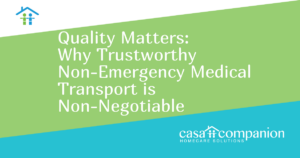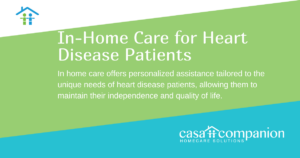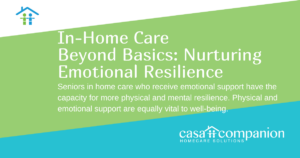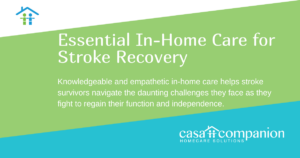How Do We Know When Our Loved One Needs In-Home Care?
In-home care can be a crucial support system for seniors and their families. Home care solutions offer personalized assistance and ensure comfort, safety, and dignity for aging loved ones. However, recognizing the right time to introduce home care can be challenging. There are several signs that indicate San Diego home care is appropriate. These signs…
Read MoreIn-Home Care vs. Facility Care: How to Make the Right Choice
As seniors age and face health challenges, they may face the choice between in home care and a facility. Both receiving care at home or moving into a facility have their benefits and drawbacks. The choice ultimately depends on individual circumstances and preferences. Are you and your family making the decision between home care in…
Read MoreIn Home Care Spring Checklist: Renew Refresh Reassess
Spring is an ideal time to reassess all aspects of your loved one’s in-home care. A reviewed and updated home care plan aligns with current needs to provide the best possible support. The needs of patients receiving in home care in San Diego evolve over time as health conditions, household safety and family caregiver information…
Read MoreQuality Matters: Why Trustworthy Non-Emergency Medical Transport is Non-Negotiable
Quality non-emergency medical transport (NEMT) is more than just a convenience; it’s a necessity for many individuals with medical needs. Patients and their families rely on these services for safe, comfortable transportation to medical appointments, treatments, and other essential engagements. Safe and trustworthy non-emergency medical transport costs more than ride sharing, but NEMT delivers peace…
Read MoreIn-Home Care for Heart Disease Patients
In-home care provides a comforting and supportive environment where heart disease patients can receive the assistance they need while maintaining their independence. Living with heart disease is challenging but the right in home care lets patients manage their condition effectively. Home care aides offer personalized assistance tailored to the unique needs of heart disease patients,…
Read MoreNew Year, New Movement: Staying Active with In-Home Care
The start of the new year inspires us to embrace a healthier lifestyle by incorporating exercise into daily routine. The journey toward wellness can be challenging for those in home care, but it is far from impossible. Staying active and energized with in-home care is a practical and achievable goal. Personalized exercise plans, integration of…
Read MoreIn-Home Care Beyond Basics: Nurturing Emotional Resilience
Emotional resilience, the ability to adapt to stress and change, is as important to being comfortable, healthy, and happy as physical safety and comfort. Seniors in home care who receive emotional support have the capacity for more physical and mental resilience. While the primary focus of in-home care is undoubtedly the physical well-being of individuals,…
Read MoreSeniors in Home Care: Nine New Year’s Health Resolutions
The turn of the new year is the perfect time to reflect on health and wellness goals for seniors receiving in-home care. The mission of in-home care providers is to enhance quality of life, promote independence, and maintain a comfortable and fulfilling environment all year long. Setting New Year’s resolutions for health and wellness in…
Read MoreIn-Home Care Strategies for a Happy Holiday Season
During the holidays, families, friends, and support networks celebrate joy, love, and traditions together. These gatherings deepen bonds, celebrate connections, and spread festive spirit at home. For loved ones receiving in home care, however, this time of year can pose unique challenges to health and well-being. These holidays center around indulgent foods, family members traveling…
Read MoreEssential In-Home Care for Stroke Recovery
Every stroke survivor’s recovery journey is a challenging time that requires comprehensive support and care. Knowledgeable and empathetic in-home care helps stroke survivors navigate the daunting challenges they face as they fight to regain their function and independence. Home care solutions promote healing, support recovery, and improve quality of life in the crucial post-stroke period.…
Read More









